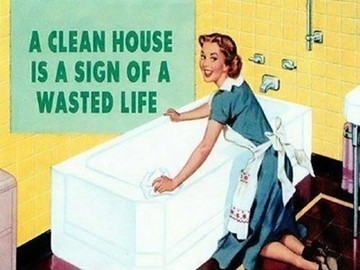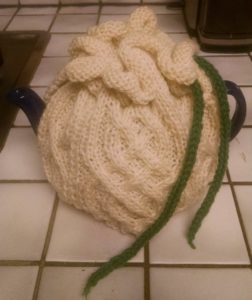
I saw this image floating around the Internet today and it severely pissed me off.
It pissed me off on several different levels. The first level is simply that one is wasting one’s life as a woman doing “women things.” Do not get me started. I mean, totally don’t. Denigrating “women’s work” is one step away from saying that if one codes as “female” one isn’t valuable.
I started the day with a home in need of a bit of TLC in terms of tidying and cleaning. It’s the end of the day, I have my feet propped up, there’s a martini at my left elbow and when I scan my immediate surroundings, I feel happy.
Why?
Things are acceptably uncluttered.
It’s not about being Perfect Little Wifey or any nonsense like that. My husband has done “housework” today, too. He made breakfast (steak and eggs, and oh my GOD was it good), cleaned up from that, emptied the dishwasher, emptied the trash, cleaned out the aquarium, made us lunch, cleaned up from that, brought me a martini… Oh, hell, I don’t remember everything that he did. He saw what needed doin’ and did it. As did I.
Did we waste the day?
Don’t be an idiot.
To both of us, a clean house means peace. It means a launchpad for other adventures. It means a place to come back to and heal from the wounds of our adventures. We’re neither of us religious, but our home is our sanctuary.
And that’s a lot of the point. I know that some people post that because they feel bad or guilty that maybe their homes aren’t “perfect.”
Mine isn’t.
Nor should it be. A home is a sanctuary, or should be. Does it enclose you and heal you and make you feel safe? Maybe you need some clutter to feel those things. That’s okay. Maybe you feel the sanctus of the sanctuary when things are ritually cleansed. (I do).
Neither side is a waste.








